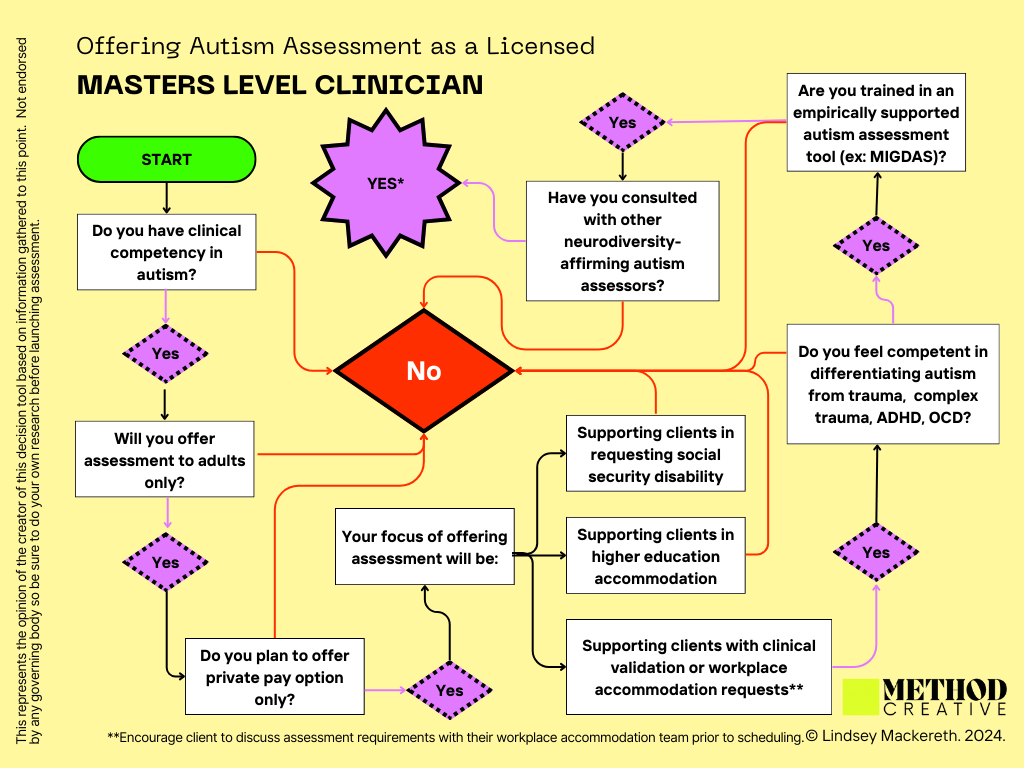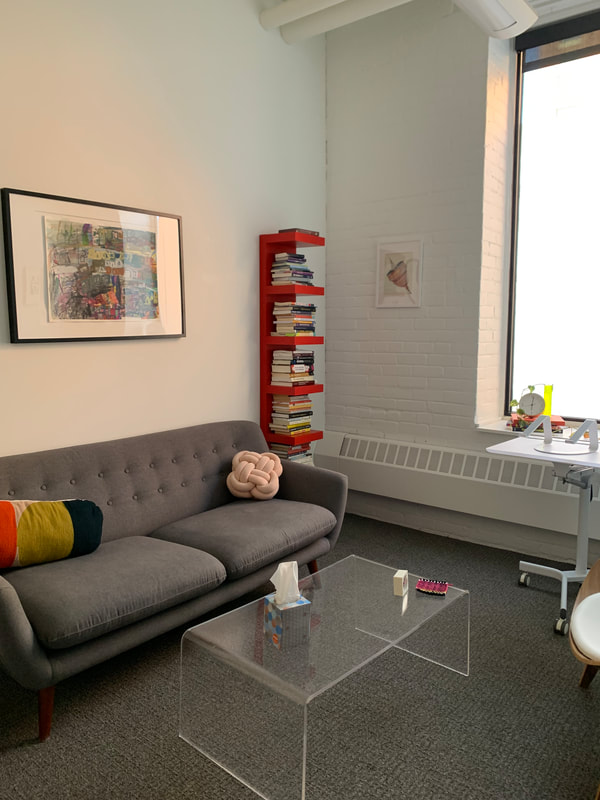|
This is a common question from Masters level licensed clinicians that has no simple answer. So, I've created a tool to help guide this important decision-making process. Leave comments with any thoughts you may have on this tree as I'd love to make this a co-creation.
-Lindsey Mackereth, MA, LPCC, LADC
1 Comment
Can you relate to any (all) of these experiences with wellness and/or healthcare providers?
All of these are versions of statements I have heard from my gifted coaching + therapy clients over the years. While there are so many phenomenal therapists, coaches + wellness providers in the world (I truly mean that), understanding + working with giftedness is a specialization like any other in the clinical + wellness worlds. Without proper competence in the area of working with gifted clients, these sessions can stir unintended discomfort, misunderstanding, misdiagnosis and, on occasion, more gifted-related trauma for the client. Method offers gifted-specific support with trained providers through gifted coaching + the life architecture program for gifted adults, which can even be a compliment to your current meaningful therapy work that may not have gifted components. We see you in all of your complexity, intensity and creativity. Also, stay tuned for Superwell, a new directory of professionals who specialize in working with creative, gifted and/or neurodivergent individuals. 🍒Lindsey, weirdo + founder of Method Creative Who is a gifted adult? It is a commonly misunderstood term with a limited traditional definition, often associated only with IQ. The reality is that there are multiple types of extraordinary abilities (including creativity!) not captured in that conventional conception of giftedness.
Common Challenges in Gifted Adults Being gifted also comes with its own unique challenges due to the overall experience of feeling misunderstood (and being misunderstood) by others. Here are some common concerns that I see in gifted clients:
Gifted Support at Method Think you may be gifted, and seeking support hasn't been so helpful in the past? Check out the Life Architecture Program at Method. This series of individual sessions consists of a multi-phase format that includes:
Most often, there is a method to my madness- a conceptual framework underlying my decisions. The Method Creative office in the North Loop of Minneapolis (fragrantly referred to as Method HQ) is no exception to this methodology in its postmodern-inspired interior decor. What Exactly is Postmodernism? My initial understanding of the postmodern movement came about in my years of art school while pursuing a BFA in studio art (I could usually be found hanging out in the dark editing suites on the 6th floor of the Humanities building) at UW-Madison. In general, the postmodern movement (~1960s-1980s) is a reaction to, and rejection of, modernism's adherence to idealism and objectivity as it pertains to human culture. As a student I was, and continue to be, intrigued by and aligned with postmodernism's skepticism of universal truths and objective reality as well as its embrace of the complexity and paradox of the individual human experience, which is reflected in the art, architecture and writing of that time. Art movements within postmodernism include intermedia, installation art, conceptual art and multimedia, particularly involving video. The focus shifted away from solely being on the finished work and more on the artist's process. Why Postmodern-Inspired Decor at Method? Prior to starting Method, I spent years being curious about (and often abhorring) the interior decor decisions made by most health and wellness organizations in which I had worked and visited. As a clinician (and sensory-oriented human) who values the contribution that the design of a space makes on creativity and expansiveness, I often found myself wondering why most wellness spaces felt so drab and uninspiring. Shouldn't wellness discussions, and the spaces this discourse takes place, be saturated in and motivated by divergent thinking? Due to the lack of data proving otherwise, I concluded (and often still do) that I was alone in this query, yet started on my mission to create Method with the dream that it would become a wellness space that challenges one's visual expectations, cleanly adorned with multimedia art, a variety of textures, shapes and light sources as well as natural elements to ignite, yet not overwhelm, the senses. A place I would want to come to as a client. In addition to making my eyeballs happy, my hope for Method's postmodern-inspired decor is to not only ignite appreciation for the influential artists of the postmodern movement but to also create a springboard, not a container, for each individual’s creative process. Keep in mind, Method's furnishings are not an exact replica of vintage postmodern interior because, how postmodern would that be? Stay weird, -Lindsey Mackereth, MA, LPCC, LADC Founder of Method Creative Want to co-work with us in Method HQ in Mpls? Go here.
For more information on Postmoderinism: -https://www.tate.org.uk/art/art-terms/p/postmodernism -https://www.theguardian.com/books/2021/nov/03/top-10-postmodern-books -https://plato.stanford.edu/entries/postmodernism/ -Or Google the crap out of it:) The term “giftedness” is a description of an uncommon complexity + intensity of cognition, emotion + sensation. A gifted person has an above average intellectual intelligence that is often combined with additional unique areas of giftedness in one or more of these other areas of intelligence, as defined by Jennifer Harvey Sallin: emotional, creative, sensual, physical, and existential.
1. INTELLECTUAL: A strong interest in: learning, problem solving, seeking truth, curiosity, reading, theory, analysis, logic and independent thinking. 2. EMOTIONAL: Complexity to emotions, strong emotional memory, deep and intense feelings, heightened sense of empathy, justice and morality. 3. CREATIVE: Ability to visualize detail. Strong interest in fantasy, inventions, music, art, humor, uniqueness. 4. SENSUAL : Enhanced sensory experience of the five senses. Often has high appreciation of beauty and harmony. 5. PHYSICAL: Advanced physical skill or dexterity, preference for physical expression + fast action. 6. EXISTENTIAL: High focus on meaning, values, ethics, morality, ecological interconnectedness, and the nature of reality. With these nuances in 'spheres' of giftedness, gifted people comprise quite the heterogeneous group, which makes it essential for each persons to discover their own giftedness profile to best understand their unique needs. Think you may be gifted? Check out the gifted services at Method. No formal giftedness identification needed to pursue these services! Just a willingness to dig into your areas of intelligence. References: Sallin, Jennifer H. What is Giftedness? http://intergifted.com/what-is-giftedness/ 2020. Gardner, H. (1983). Frames of Mind: The Theory of Multiple Intelligences. New York: Basic Books. Seasonal affective disorder (SAD) is a type of depression that is directly related to -- you got it! -- changes in seasons. Symptoms tend to begin and end around the same time each year and usually start in the autumn and continue into the winter months. Common symptoms associated with seasonal affective disorder include:
If this sounds familiar to the experience of you or someone you know, here are some tips to combat SAD and prepare to make this seasonal shift a bit more bearable: 1. Light therapy // Light therapy involves using a special light box or lamp that produces similar effects to natural light, triggering chemicals in your brain that help regulate your mood.
2. Exercise // Regular exercise (30-60 minutes, 3-5 times per week) can boost serotonin, endorphins, and other feel-good brain chemicals. Even better if you're able to exercise outside in natural daylight (see #3). 3. Getting outside // Fresh air + sunlight (think Vitamin D) can be just want your body + mind are in need of as the colder weather keeps you indoors most of the time. Walking your dog (or just yourself) outside for 15-20 minutes 5 times per week may be enough to improve your mood. 4. Relaxation + yoga // Breath work (try it in front of your light therapy!) and 20 minutes/day of yoga have been shown to alleviate symptoms of depression, including seasonally-induced mood shifts. 5. Creative play // Creativity can be negatively affected as seasons change, so it is important to create space for creative exploration to keep those juices flowing and mood lifted. Ideas include: carrying a sketchbook, scheduling a group creating session via Zoom with other makers, order some new supplies, set monthly creative goals (ex: 2 hours of creating each week, one completed project, etc.). Have fun! 5. Rituals// With so much darkness, it can be life-giving and mood-boosting to create daily rituals to mark transitions toward + away from work/home life. Diffuse some invigorating oils to start your day (rosemary + mint for me!) or light a candle when the work day has ended and your restoration time has begun. 6. Balanced diet // Crave carbohydrates in the winter? Eat those carbs while making sure to balance out your diet with fresh fruits, vegetables, lean portions and whole grains to help stabilize blood sugars and, thus mood. 7. Therapy // Counseling or therapy can help you to feel supported as well as to identify + change negative thoughts, challenge avoidance, and learn stress management skills. 8. Medication // Some people with SAD benefit from antidepressant treatment, especially if symptoms are severe. Be sure to check with your medical provider if this is a tool you'd like to incorporate into your self care plan. 9. Avoiding drugs + alcohol // Be aware of any inclination to self-medicate seasonal depression. While alcohol and drug use may seem to bring immediate relief, they actually perpetuate depression + anxiety long term. Hope this gives you some ideas as to how to alleviate any seasonal mood shifts. Nothing changes if nothing changes, so try something new this winter! You are so worth it. Reference for symptoms: https://www.mayoclinic.org/diseases-conditions/seasonal-affective-disorder/symptoms-causes/syc-20364651
1. Beeswax Candles (classic hygge essential, amiright?)
My ritual is to light a few candles at the end of a long day to restore in true winter hygge fashion. I have loved the 100% pure Minnesotan beeswax candles from Slow Burn, hand poured out of the owner, Sara's, home in St Paul, MN. I'm also planning to buy one of every geometric candle design (and stock) by local artist Torey Erin, the candlemaker @_w_a_x_i_n_g_. 2. Outdoor Gear (+ XC Skis!) I made the leap and invested in some cross country ski gear this year for the first time in my LIFE and it has been doing wonders for my seasonal mood + creativity. I generally have my best creative ideas on longer walks, runs or bike rides and xc skiing is making space for my creative juices to flow in the winter months. I am also getting the benefits of ecotherapy as xc skiing allows more time in nature, directly appreciating the resilience of wildlife in winter months. 3. Weighted Relief Pillow These are new from Ethel Studios, so I just ordered mine. The zero-waste weighted Relief Pillows, "combine colorful patchwork with a comforting malleable structure to help form around your body where you need grounding and relief...Heat your pillow in the microwave to add warmth, or place your pillow in the refrigerator or freezer for a cooling effect." Ethel Studios' recommended uses for the pillows include as "a heating pad for anxious tummies" and "a hot or cold compress for tired muscles" among other creative uses. Sign me up! 4. Dream Journaling I have been keeping a log of my dreams as a way to tap into my creative unconscious this winter. Seriously! There is a lot that our unconscious is working through as we sleep and much of this decoding can be done on our own... but we need to pay close attention to the content and themes of our dreams. I prefer to use pen and journal to log my dreams, but a journaling app could suffice if that better suits your preferences. 5. Beeswax Lip Balm With a focus on creating a simple and pure product, Portland duo Brad + Anika combine urban beekeeping and organic, locally sourced ingredients to create Portland Bee Balm. They even wrap the balms in real wood instead of processed paper. I have all 4 of the main flavors and love them all in this cold + dry winter climate. 6. Organic Essential Oils Aromatherapy is a go-to for me throughout the year, but I rely on essential oils even more in the winter while I can't access the aromas of nature as readily on hikes. I love the quality + mission of Pranarom that includes sustainable harvesting methods and organic plants. My Wellness Blend Picks: Sleep Aid + Mental Clarity. 7. Circadian Optics SAD Lamp Light therapy involves using a special light box or lamp that produces similar effects to natural light, triggering chemicals in your brain that help regulate your mood. I recommend (and use!) the Circadian Optics Lumos 2.0 for it's UV-free brightness (10K Lux) and adjustability. Start with 10-20 minutes per day of basking for winter mood improvement! 8. Warm Beverages As many of my clients know, coffee is my morning (and afternoon) treat. During winter months, sipping a warm beverage at certain times of the day can create meaningful ritual to start/end the work day, replace alcohol, or ignite sleepiness at the end of a long day. Being mindful of yourself (and your relationship with caffeine), find a warm beverage that can a sense of inner calm, warmth and wellbeing this winter. Can't wait to check out The Get Down Coffee, Co. this spring! You in? 9. Alarm clock Benefit your ZZZs by keeping your phone out of your room and using an old school alarm clock. Any alarm clock will do, but I recommend a style that emulates a sunrise for these winter months. Who is a gifted adult? It is a commonly misunderstood term with a limited traditional definition, often associated only with IQ. The reality is that there are multiple types of extraordinary abilities (including creativity!) not captured in that conventional conception of giftedness.
Being gifted also comes with its own unique challenges due to the overall experience of feeling misunderstood (and being misunderstood) by others. Here are some common concerns that I see in gifted clients:
Gifted Support at Method Think you may be gifted, and seeking support hasn't been so helpful in the past? Check out the Life Architecture Program at Method. This series of individual sessions consists of a multi-phase format that includes:
|
Method Blog.By Lindsey Mackereth, MA, LPCC, LADC Archives
March 2024
Categories
All
|














 RSS Feed
RSS Feed
